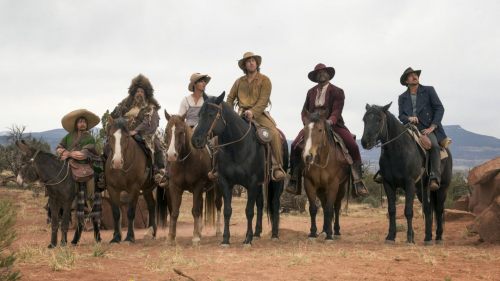DISNEY/NETFLIX – Where Are We Now That DISNEY+ Is Almost Here?
Back in December of 2017, about a month after it was first reported Disney was negotiating with Rupert Murdoch to buy Fox, I wrote this piece for BMD about why it was meaningful beyond the Marvel connections and how it could be seen as a “symbol of the film entertainment industry's current slate.” After listening to, in my opinion, Disney’s rather remarkable quarterly earnings call recently, I thought It might be worth looking back at that piece and seeing how far Disney has come – and also where Netflix is. After all, I wrote that “The most interesting event happening in the film entertainment world is a race to see if Netflix can become Disney before Disney can become Netflix.” Where is that race now?
How is Netflix doing in their race to become a major studio? They’ve joined the MPAA for starters. They’ve won some Oscars. Two for Roma, including best director, and the best documentary feature for their Sundance acquisition Icarus as well as for two documentary short films. They’ve fulfilled their promise to release upwards of 80 original films (or more) in 2018 and beyond. While Netflix counts select acquisitions as “originals”, this is quite an impressive number and doesn’t even include the TV programs they are producing. While 80 was the goal for 2018, they (according to Wikipedia) got to 92 in 2018 and will hit over 100 in 2019

They also look like they’ve upped their prestige/awards game in 2019 to be among the industry's leaders. As of this writing, the Gold Derby experts have The Irishman as the favorite for Best Picture at 7/1 odds and Marriage Story with the third most favorable odds at 8/1. The Two Popes is 13th at 33/1 and Dolemite is My Name is 14th at 100/1. That’s two films in 2019 with a shot at Best Picture for Netflix with two others in consideration. No other studio can brag about that many (Sony does have three in the top 10 and four in the top 20 if you count Sony Pictures Classics). Marriage Story and/or Irishman all have favorites in the top five in directing and acting categories as well.
Netflix has also slightly relaxed their theatrical policy. In 2017, I remarked that only a few Netflix films got a theatrical release and when they did, it was only to placate talent or for an awards push. This is still largely true, but the difference is that starting with ROMA, they actually gave their films a theatrical window. It's still not large enough to entice the major circuits to play the film, but some window is more than no window.
Theatrical is still a work in progress for Netflix as they continue to be of two minds inside that company about what theatrical means for them going forward. For our purposes here, their theatrical titles – both in how they release and what they release – are nowhere close to Disney. As of this writing, Disney has four of the top five grossing films of 2019 and five of the top ten – with Frozen 2 and Rise of Skywalker expected to join the top ten (or even the top five) later this year.
For their high demand titles, Netflix continues to operate in what I’ll call the “Turnaround” space meaning that most of their highest profile releases – including The Irishman – were either produced or set up in development at a major studio – and then sold off to Netflix to avoid a costly loss as a theatrical release or, as the case with Irishman, picked up and produced by Netflix after the original studio put the film in turnaround and no one else picked it up.
Netflix doesn’t share true performance metrics as a means to compare one piece of content to another so we can only guess how deeply their movies enter the consciousness of the movie-going public. Even when tens of millions of homes watch a film like Birdbox in over a week, we can’t compare them (yet) to what Disney is doing with releases like Avengers or Lion King that don’t just dominate the box office but also how we think about movies themselves. Birdbox may be their one true “blockbuster” as that had some social media interaction beyond the Netflix PR statements about how many homes watched the film.
So while Netflix has been extremely successful in building an awards slate and also successful in becoming a destination where filmmakers can realize passion projects that are no longer part of studio thinking, they have failed in creating or finding films that will truly make them a destination for high demand content. To be clear, they have had success in this space with TV as Stranger Things is now event viewing like tentpole theatrical movies, and shows for the masses like Fuller House get a lot of eyeballs. However, they are still not in a position where they can compete with Disney with high demand content.
So where is Disney? Iger confirmed back in April that they wouldn’t have targeted Fox if it wasn’t for streaming, which was my main point in my 2017 essay. That point was more and more reinforced last week with their investor call. Iger spent a lot of time going over the financials – which he should do for his investors, and they are strong as usual. However, it's his bit about the Disney+ launch and where it was going that has the most relevance to this conversation.
First, he wouldn’t give out subscriber numbers (he will once it's live), but he confirmed it will be on all the major streaming platforms and smart TV’s. He also hinted to the Verizon deal which would offer Disney+ for free to its customers. Couple this with a deal at 33%-off that Disney was offering anyone who wanted to lock in a three-year subscription (not to mention their Hulu/ESPN bundle), and it's clear that Disney+ is going to launch with millions and millions of more subscribers than anyone expected. Iger also referenced a test launch in the Netherlands that was “very, very positive” and "the demographics were far broader than a lot of people expect them to be. This is well beyond kids and family".
Now that we can assume Disney+ is going to launch with a lot more subscribers than expected, what else can we talk about? It's not just important to grab new subscribers, these platforms need to keep them or reduce “churn”, so they need fresh content. One of the issues I was worried about with Disney+ was that the average customer might quickly burn through its starting content. Yes, they have The Mandalorian, a Star Wars series featuring Werner Herzog himself, right at launch, and they have a lot of Pixar, Marvel and Lucasfilm theatrical releases. Would this be enough to keep you on your couch weekend after weekend? Netflix's biggest advantage is they have so much content they have produced or acquired. It's honestly a huge lead. Disney (and Comcast and AT&T and Apple and so on) have a lot of catching up to do. This was my biggest worry with Disney+ but Iger has eliminated those worries. He is clearly aware of how much content he needs to keep growing a subscriber base, so he threw some huge numbers out on the earnings call:
- Within five years, Disney+ will contain 620 movies and 10,000 television episodes
- By then, Disney will also be adding 60 original pieces of content annually to the platform
Keep in mind, Netflix augments its productions with acquisitions both on the TV and film side. Disney will be relying on both their mammoth IPs and their brand for originals. I really feel these numbers are just jaw-dropping considering they will be produced by Disney. Netflix has Stranger Things but Disney has Mandalorian, and The Falcon and the Winter Soldier and Wandavision and Loki and What If...?, and Hawkeye and you get the idea.
Additionally, lets refer to the 2017 piece:
I would argue that Disney is not going to merge the two production companies, but will greatly reduce or even eliminate Twentieth Century Fox and its arthouse label Fox Searchlight and incorporate the franchise pieces (Marvel properties licensed to Fox) and select Fox movie franchises it sees potential in continuing (Avatar maybe Night at the Museum given its family friendly content). The others, including Die Hard, Alien, Planet of the Apes, Kingsman, Predator, Home alone, The Omen, and Ice Age will likely be turned into TV and streaming properties.
This was why I thought Disney bought Fox, and we’re about to see all this come to fruition. We’re going to get movies and shows from all these Fox IPs. Whatever is not appropriate for family fare will go to Hulu (which can be bundled with Disney+ for cheap) and Iger confirmed Fox Searchlight will start providing content for Hulu as well as what's been strongly hinted at before – Hulu will now be the non-linear home for FX content. The next Ice Age will go to Disney+ and that Alien origin, home planet series at $10m an episode will be broadcast on FX and Hulu.
In 2017, I wrote, “Disney must create an offering now that will be appealing and then attract at least half the subscribers Netflix has before Netflix can accumulate enough high demand original content on its own.” Here we are, on the eve of Disney+’s launch date and who has done more, Disney or Netflix? Has Netflix done enough to accumulate high-demand original content or has Disney done more to gain a ton of subscribers? It’s not really a question, is it? It’ll be interesting to see the rest of the race play out, but we are really at the first turn and Disney is so far ahead, I’m ready to call it over via the mercy rule.



